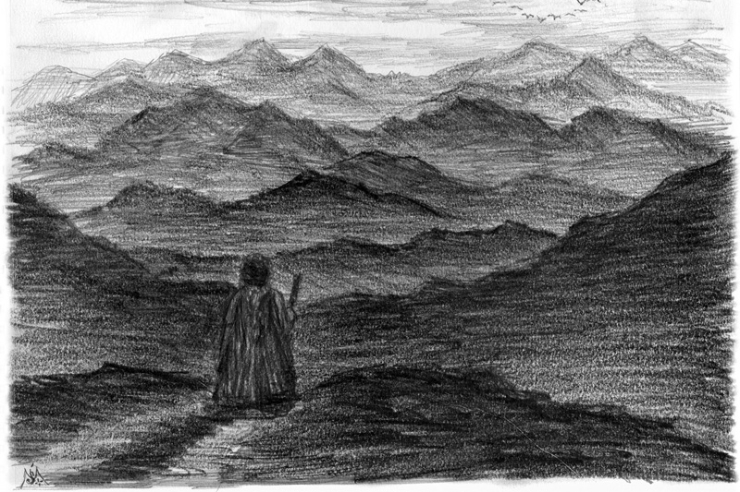 “O give thanks to the Lord, for he is good; for his steadfast love endures for ever!” (Psalm 107:1)
“O give thanks to the Lord, for he is good; for his steadfast love endures for ever!” (Psalm 107:1)
I pressed the down button and waited for the elevator. We were at Johns Hopkins Neurology Clinic where my husband and I had just met with a genetic specialist about my son, Patrick.
The doctor had given us a thorough overview of Patrick’s new medical diagnoses and the words that accompanied it—genetic disease, benign tumors, learning disabilities, and delayed gross motor skills. An hour before, I never considered the ramifications of the words the doctor tossed at us, but in a short 60 minutes, these words became our new reality. We stood quiet and numb. I fought back tears.
The elevator door opened and I walked in, which is when I noticed them.
A mother stood behind her grown daughter, who was slouched in a wheelchair. The daughter was bald, donned a terrycloth bathrobe over her street clothes, and her skin was grey. The mother barely noticed us as she fussed over the wheelchair and the position of her adult child. I watched the two of them—the one serving effortlessly and the other suffering silently—and I swallowed hard.
Death was in that elevator.
The encounter gave me pause.
I’d been wallowing in my own grief over my son’s diagnosis just a moment before and now here before my very eyes was this witness of a mother and her dying daughter.
The diagnosis the doctor had just given us did involve health issues for Patrick, but nothing he told us about involved death as a prognosis. Sure, Patrick was bound to face some physical challenges, but all people have to deal with difficult things. For the most part, Patrick was healthy and he was definitely happy. The situation we were facing was vastly different than the one next to me in the elevator. In an instant my perspective shifted and I began to tick off the things for which I was grateful—
“Thank you, Lord, for good doctors, reputable medical facilities, for modern medicine, and for Patrick.”
I don’t know what happened to that woman and her daughter, but I do know I’ve never forgotten my brief encounter with them.
A year later, Patrick did experience some serious medical complications of his own. Two days after Christmas, he had his first seizure, an episode that launched our entire family into a yearlong medical drama. For twelve months, Patrick underwent every kind of neurological testing available—cat scans, MRI’s, EEG’s, spinal taps, and even a brain biopsy—all to determine the root cause of his seizures. He also ingested a regular pharmaceutical cocktail of meds to control them.
This was an emotionally grueling experience for both my husband and me, but every time I thought I was at my breaking point, every time I thought I couldn’t face one more horrible medical crisis or watch Patrick undergo another invasive medical test, I met a parent who was dealing with something worse.
There was the grandmother whose grandson was having repeated seizures from a large brain tumor.
There was the mother down the hall whose child had brain cancer, which required invasive surgery.
There was the young girl—bald and nauseated—sitting in the oncology clinic all day while an IV dripped potent fluids into her veins.
Every time I started feeling sorry for myself, every time I wondered if our situation could get any worse, I encountered someone whose suffering was graver than my own. These brief interactions enabled me to express prayers of thanksgiving—gratitude for the suffering I had—instead of anger and resentment for the suffering I faced.
I’ve always been struck by the story in the Gospel, the one where Jesus heals the 10 lepers but only one comes back to thank him (Luke 17: 11-19). Why was there only one leper who returned to say thank you for his healing?
I’m convinced it’s because he had long cultivated the habit of gratitude. In the midst of painful sores, wounds, and loneliness, he must have found a way to be grateful, even though he had plenty of reason to complain. This practice of gratitude made it easy for him to run to the Lord and offer his thanks for a miraculous healing. His words of gratitude weren’t a fluke—they were a carefully repeated custom, a daily decision to be thankful, no matter what the situation.
In his letter to the Thessalonians, St. Paul reminds us “In all circumstances give thanks, for this is the will of God for you in Christ Jesus” (1 Thessalonians 5:18). Of course, gratitude in the midst of suffering is easier said than done. I love what C.S. Lewis says about the impalpability of pain when he writes: “I am not arguing that pain is not painful. Pain hurts. That is what the word means. I am only trying to show that the old Christian doctrine of being make ‘perfect through suffering’ is not incredible” (Problem of Pain).
And it’s true. Pain isn’t fun, but pain, if we let it, can bring us closer to Christ. It can help us live life that one leper, so acutely aware of the depth of God’s goodness and love for us—in the good times and the bad—that we run to Him, glorifying His holy name, as we as we fall at His feet in thanksgiving.
“O give thanks to the Lord, for he is good; for his steadfast love endures for ever!
“Let them thank the Lord for his steadfast love, for his wonderful works to the sons of men! For he satisfies him who is thirsty, and the hungry he fills with good things” (Psalm 107:1,8-9).
If you liked this article, please share it with your friends and family using the Recommend Social Media buttons below and via email. We value your comments and encourage you to leave your thoughts below. Thank you! – The Editors














